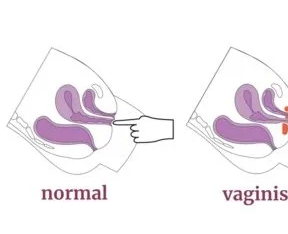Vaginismus is a condition characterized by an involuntary tightening or spasming of the pelvic floor muscles surrounding the vagina, which can make penetration painful or impossible. It may occur during sexual intercourse, tampon insertion, or gynaecological exams. The onset of vaginismus can be related to a variety of factors, including psychological issues like anxiety, fear, past trauma, or physical conditions. Treatment often involves therapy, pelvic floor exercises, and gradual desensitization to help individuals manage the condition and improve their sexual health. It’s important for those experiencing symptoms to consult a healthcare professional for guidance and support.
Understanding the causes of Vaginismus
The causes of vaginismus can be varied and may include both physical and psychological factors. Some common causes include:
- Psychological Factors: Anxiety, fear of pain, past sexual trauma, or negative experiences related to intercourse can contribute to the condition.
- Relationship Issues: Problems in a romantic or sexual relationship, such as lack of communication, trust issues, or unresolved conflicts, may play a role.
- Physical Factors: Medical conditions such as infections, pelvic inflammatory disease, or pelvic floor disorders can lead to discomfort or fear during penetration.
- Cultural or Religious Influences: Cultural beliefs and attitudes towards sex can create anxieties or fears that contribute to vaginismus.
- Lack of Sexual Education: Insufficient understanding of one’s body, anatomy, or sexual health can result in fear and anxiety about sexual activity.
- Hormonal Changes: Conditions affecting hormones, such as menopause or hormonal imbalances, may also contribute to the problem.
Finding the underlying cause is essential for effective treatment, so it’s important to consult a healthcare professional for a proper diagnosis and management plan.
Understanding symptoms of Vaginismus

The symptoms of vaginismus primarily revolve around discomfort during sexual activities, and they can vary in intensity. Common symptoms include:
- Pain During Intercourse: Experiencing significant discomfort or pain during penetration, which can make sexual intercourse difficult or impossible.
- Involuntary Muscle Spasms: The pelvic floor muscles may involuntarily tighten or spasm when attempting intercourse or inserting tampons.
- Fear or Anxiety: Many individuals may feel a sense of dread, panic, or anxiety at the thought of sexual activity or penetration.
- Difficulty with Gynecological Exams: Some may find it challenging to undergo routine gynaecological examinations due to similar discomfort.
- Reduced Sexual Desire: The pain and anxiety associated with vaginismus may lead to a decrease in sexual desire or avoidance of sexual intimacy altogether.
- Emotional Distress: Feelings of frustration, shame, or low self-esteem related to the condition can also be present.
If someone is experiencing these symptoms, it’s important to seek guidance from a healthcare professional for proper assessment and support.
Does Vaginismus cause infertility?
Vaginismus itself does not cause infertility, but it can complicate attempts to conceive. Vaginismus is characterized by involuntary spasms of the pelvic floor muscles, making penetrative intercourse painful or difficult. This can lead to challenges in sexual activity, which may hinder achieving pregnancy.
If someone experiences vaginismus and is trying to conceive, it is essential to seek guidance from a healthcare professional. They can provide support and treatment options to help manage the condition, potentially improving the chances of conception.
An advice from ZIVA Fertility clinics about treatment for Vaginismus

Vaginismus is a condition characterized by involuntary muscle spasms in the pelvic floor muscles that can make vaginal penetration painful or impossible. Treatment for vaginismus often includes a combination of approaches:
Education and Counseling: Understanding the condition is crucial. Counselling may help address any underlying psychological factors, such as anxiety or fear related to penetrative sex.
Pelvic Floor Physical Therapy: A specialized physical therapist can help with techniques to relax and control the pelvic muscles. This can include exercises and manual therapy.
Vaginal Dilators: Gradual use of vaginal dilators can help desensitize the area and allow for greater comfort during penetration. They come in different sizes to slowly acclimate the body.
Cognitive Behavioral Therapy (CBT): This therapy may assist in addressing any negative thoughts or fears associated with sexual activity.
Medical Intervention: In some cases, medications, such as muscle relaxants or local anaesthetics, might be recommended to help ease tension in the pelvic floor.
Sex Therapy: Working with a sex therapist can provide strategies for overcoming vaginismus and improving intimacy.
Relaxation Techniques: Practices such as deep breathing, yoga, and mindfulness may help in reducing anxiety and promoting relaxation.Please consult us at ZIVA fertility clinics who can tailor the treatment plan to individual needs. For more information, please visit our website https://zivafertility.com/ or contact us at 919100002737, +919347406900, info@zivafertility.com
















